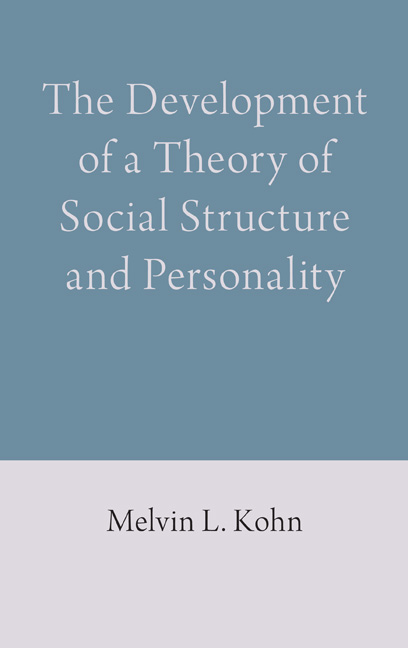Book contents
- Frontmatter
- Contents
- Preface
- 1 Hagerstown and Schizophrenia
- 2 Social Stratification and Parent–Child Relations in Washington, DC
- 3 The Torino Study
- 4 Men Employed in Civilian Occupations in the United States
- 5 The Transformation of the Occupations Study into a Longitudinal Analysis
- 6 Life on Sabbatical Leave in Norway and at the National Institute of Mental Health
- 7 Class, Stratification, and Personality
- 8 Poland under Communism
- 9 Occupational Self-Direction and Distress in Poland
- 10 The Vietnam War, Nixon, and Me
- 11 Japan
- 12 Germany – West and East
- 13 Poland and Ukraine in Transition to Capitalism and Democracy
- 14 The Presidency of the American Sociological Association, Ronald Reagan, and My Job Switch
- 15 My Two Exploratory Expeditions to China
- 16 China in Transition to a Modern Economy
- 17 Retirement, and My Last Sabbatical, at Deep Springs Junior College
- 18 The Theory I Propose
- Index
4 - Men Employed in Civilian Occupations in the United States
Published online by Cambridge University Press: 12 July 2019
- Frontmatter
- Contents
- Preface
- 1 Hagerstown and Schizophrenia
- 2 Social Stratification and Parent–Child Relations in Washington, DC
- 3 The Torino Study
- 4 Men Employed in Civilian Occupations in the United States
- 5 The Transformation of the Occupations Study into a Longitudinal Analysis
- 6 Life on Sabbatical Leave in Norway and at the National Institute of Mental Health
- 7 Class, Stratification, and Personality
- 8 Poland under Communism
- 9 Occupational Self-Direction and Distress in Poland
- 10 The Vietnam War, Nixon, and Me
- 11 Japan
- 12 Germany – West and East
- 13 Poland and Ukraine in Transition to Capitalism and Democracy
- 14 The Presidency of the American Sociological Association, Ronald Reagan, and My Job Switch
- 15 My Two Exploratory Expeditions to China
- 16 China in Transition to a Modern Economy
- 17 Retirement, and My Last Sabbatical, at Deep Springs Junior College
- 18 The Theory I Propose
- Index
Summary
The inspiration for this study came from the fourth paper in the series about Washington, with its speculations about why social class bore so striking a relationship with parental values – and with values and orientations more generally. The key, I speculated, was in the opportunities (or lack thereof) for exercising self-direction in one's work. When a recently hired colleague, Carmi Schooler, read my proposal to do this research, he came rushing into my office, shouting, “this is great stuff, we've got to test those ideas.” We joined forces. I had with a nearly complete lack of advance knowledge thus acquired a lifelong collaborator in Carmi Schooler. We planned a huge, expensive, but eminently worthwhile study.
The new study, in effect, was my collaborators’ and my reward for the success of our study in Washington, DC, and for Len's success in his study of Torino. Our small-scale, inexpensive studies had been eminently successful, and we were as a result given the resources for a national study of men employed in civilian occupations in the United States. It was to be a huge study of more than 3,000 men representative of all men in the contiguous United States employed in civilian occupations. We could with such a large sample generalize our findings to the entire country, a vast improvement over being able to speak only of the (atypical) Washington community.
I hasten to add that we would have much preferred an even larger study, one of both men and women employed in civilian occupations in the United States. But we settled for a study of men, for now, with every intention of adding women at some later stage when we had analyzed our sample of men. In retrospect, we might better have settled for a smaller sample of men and a comparable sample of women, but we did not have the foresight to see that newly invented statistics would soon make possible the efficient analysis of smaller samples. In any case, the large numbers proved invaluable for later detailed analyses.
We now experienced a gigantic change in our conditions of work. We shifted from a small-scale, local study, in which we employed “young people” as interviewers in the study of a local community, to contracting with a splendid nationwide research organization, the National Opinion Research Center of the University of Chicago, to do the fieldwork for us.
- Type
- Chapter
- Information
- Publisher: Anthem PressPrint publication year: 2019



